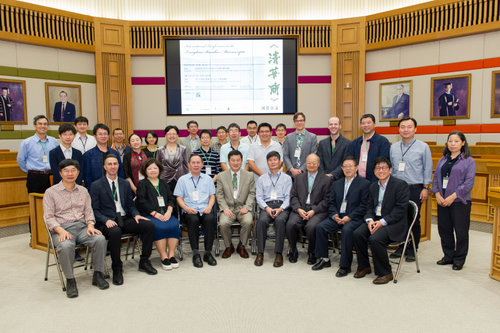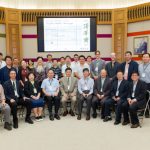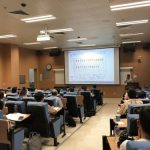 Group photo
Group photo
An International Conference on the Tsinghua Bamboo Manuscripts was held recently, to discuss matters related to Volume VII of the Tsinghua Collection of Bamboo Slip Manuscripts published earlier this year. The event was co-organised by the Department of Chinese Language and Literature of the University of Macau (UM), Jao Tsung-I Academy of Sinology of Hong Kong Baptist University (HKBU), and the Research and Conservation Center for Excavated Texts of Tsinghua University. It aimed to foster closer ties among the organisers as well as their ties with other well-known research institutions in order to push forward the pioneering study of the manuscripts.
Ever since the announcement of its discovery, Tsinghua University’s collection of bamboo slip manuscripts dating back to the Warring States period has attracted serious academic interest, and has been widely considered as one of the most important corpora of excavated texts ever discovered in China, comparable to the Confucian scriptures found in the walls of Confucius’ house in the Former Han dynasty and the historical documents found in the Warring States tomb of Duke Xiang of Wei located in Ji commandery during the Western Jin period. The Tsinghua Bamboo Manuscripts are indispensable to the studies of early Chinese history, intellectual history, and literature.
The conference attracted over 30 outstanding scholars from mainland China, Hong Kong, Macao, the United Kingdom, the United States, and Singapore. The opening ceremony was held at HKBU, with the rest of the conference taking place at UM. During the opening ceremony, Chen Zhi, initiator and convenor of the conference, who is also a chair professor from the Department of Chinese Language and Literature, UM; Prof Zhao Ping’an, deputy director of the Research and Conservation Center for Excavated Texts, Tsinghua University; and Dr Adam Schwartz, acting director of Jao Tsung-I Academy of Sinology, HKBU, delivered their opening remarks. Prof Zhao also read a congratulatory message from Prof Li Xueqin from Tsinghua University.
Prof Hong Gang Jin, dean of UM’s Faculty of Arts and Humanities (FAH); Prof Shi Jianguo, associate dean of UM’s FAH; and Prof Xu Jie, head of UM’s Department of Chinese Language and Literature, attended the welcoming dinner. During the dinner, Prof Jin warmly welcomed the honourable guests, and said that while UM is a relatively young university and the FAH was only established in recent years, the university strives to become a first-class educational institution with excellent humanities programmes. Thus, the conference provided an excellent opportunity to develop mutual understanding and rapport among participating institutions and to illuminate scholarship. In his welcoming speech, Prof Xu said the Department of Chinese Language and Literature places an emphasis on cutting-edge scholarly works and international cooperation so as to play a better role in pushing forward the integrative study of classical Chinese studies and sinology.
Every day, the conference started with one to two close reading session(s) of a rediscovered texts from Volumn VII of Tsinghua Bamboo Manuscripts, chaired by four research fellows from Tsinghua University’s Research and Conservation Center for Excavated Texts, namely Zhao Ping’an, Li Junming, Liu Guozhong, and Ma Nan. The sessions were then followed by panel discussions on the text in question or related works, to help the audience gain a deeper understanding of the manuscripts. Scholars and paleographers expressed their views on the transcriptions in the official publication, and shared insights into the manuscripts from the perspectives of paleography, textual studies, historiography, and intellectual history, paving the way for further research studies.
View gallery


